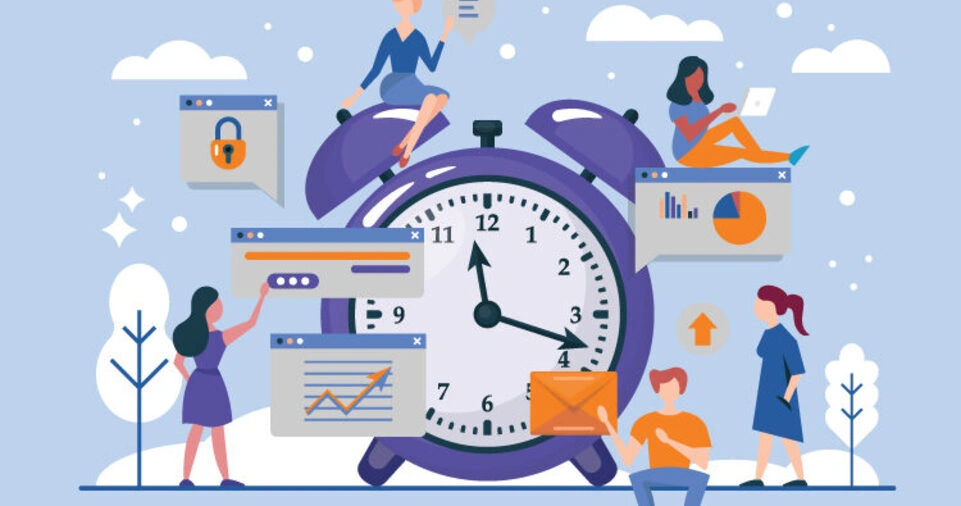In today’s fast-paced and competitive world, maintaining a healthy work-life balance has become more challenging than ever.
The constant pressure to meet deadlines, achieve career goals, and stay productive often leads people to overwork, neglecting their personal lives.
This imbalance can result in stress, burnout, and even serious health problems, affecting both professional performance and overall well-being.
A well-balanced life ensures that you have enough time to focus on your career while also prioritizing personal interests, health, and relationships.
When you effectively manage your time and energy, you can enhance your productivity, maintain mental clarity, and enjoy a fulfilling life outside of work.
Whether you’re an employee, entrepreneur, or freelancer, striking the right balance between work and personal life is crucial.
This guide explores practical strategies that help you set boundaries, manage time efficiently, take breaks, and nurture your mental and physical health.
By implementing these steps, you can achieve a sustainable and rewarding work-life balance.
Set Clear Boundaries
Why Boundaries Matter
Boundaries are essential in maintaining a healthy separation between work and personal life.
Without clear boundaries, it becomes easy to overwork, leading to exhaustion and reduced efficiency.
Setting and enforcing boundaries ensures that work doesn’t consume all your time, allowing you to engage in personal activities and relationships.
How to Set Work Boundaries
- Define Work Hours: Establish fixed work hours and adhere to them strictly. Avoid working late into the night unless absolutely necessary.
- Communicate with Employers and Clients: Inform your employer or clients about your availability. Let them know when you’re off-duty to prevent unnecessary interruptions.
- Create a Dedicated Workspace: If working remotely, designate a specific area for work. This helps differentiate professional and personal spaces.
- Turn Off Work Notifications: Disable work-related notifications during personal time to avoid distractions.
- Avoid Bringing Work Home: If possible, leave work at the office. When working remotely, close your workspace after working hours.
Setting boundaries ensures that you have time to relax, recharge, and engage in personal interests, leading to improved job satisfaction and mental well-being.
Prioritize and Manage Time Efficiently

The Importance of Time Management
Time management is crucial for maintaining a balanced life. Poor time management often leads to excessive workload, stress, and reduced efficiency.
By organizing your tasks effectively, you can accomplish more in less time, reducing the need to work overtime.
Time Management Techniques
- Use a To-Do List: List daily tasks and prioritize them based on urgency and importance.
- Time-Blocking Method: Allocate specific time slots for work tasks, meetings, and personal activities to maintain a structured schedule.
- Set Realistic Goals: Avoid overloading your schedule. Set achievable targets that don’t compromise personal time.
- Learn to Delegate: Share tasks with team members or hire assistance when needed.
- Limit Time on Unproductive Activities: Reduce distractions such as excessive social media use, unnecessary meetings, or lengthy phone calls.
Effective time management allows you to complete tasks efficiently while ensuring ample personal time.
Take Regular Breaks
Why Breaks Are Important
Many people believe that working continuously increases productivity, but in reality, prolonged work leads to burnout and decreased focus.
Taking breaks rejuvenates the mind and body, improving overall efficiency.
How to Take Breaks Effectively
- Follow the Pomodoro Technique: Work for 25-50 minutes, then take a short break of 5-10 minutes.
- Step Away from Screens: Avoid excessive screen time by engaging in non-digital activities during breaks.
- Incorporate Movement: Take short walks, stretch, or engage in quick physical activities to refresh your body and mind.
- Practice Deep Breathing or Meditation: Engage in breathing exercises or mindfulness techniques to reduce stress and enhance focus.
- Use Breaks for Refreshment: Drink water, have a healthy snack, or listen to music to recharge yourself.
Taking regular breaks prevents exhaustion and enhances long-term productivity.
ALSO READ: Where to Buy the Best Hair Removal Machine: A Buyer’s Guide
Learn to Say No
The Power of Saying No
Many professionals struggle with declining tasks, fearing missed opportunities or disappointing others.
However, taking on too much work leads to stress and poor performance.
How to Say No Politely
- Be Honest About Your Workload: If you’re overloaded, explain why you can’t take on additional tasks.
- Suggest Alternatives: If possible, recommend someone else who can help.
- Prioritize Your Tasks: If a request doesn’t align with your goals, politely decline it.
- Practice Assertive Communication: Express your refusal in a respectful but firm manner.
Learning to say no allows you to focus on important tasks while maintaining a balanced lifestyle.
Make Time for Personal Activities

Why Personal Time Matters
Engaging in hobbies and spending time with loved ones is crucial for mental health and overall happiness. Personal activities help relieve stress and enhance life satisfaction.
Ways to Prioritize Personal Activities
- Schedule Personal Time: Treat personal activities as important as work meetings.
- Engage in Hobbies: Pursue interests such as reading, painting, music, or sports.
- Spend Quality Time with Loved Ones: Plan regular family or social outings.
- Exercise Regularly: Physical activity improves mood and energy levels.
Allocating time for personal interests ensures a well-rounded and fulfilling life.
Unplug from Technology
The Impact of Constant Connectivity
Being constantly connected to work emails and messages can lead to stress and work-life imbalance.
How to Unplug Effectively
- Set Screen-Free Hours: Avoid screens at least an hour before bedtime.
- Use Digital Detox Days: Designate a day where you minimize digital device use.
- Limit Social Media Usage: Avoid excessive scrolling during personal time.
Reducing screen time enhances mental clarity and promotes a healthier lifestyle.
Practice Self-Care
Importance of Self-Care
Self-care is essential for maintaining mental and physical well-being. Ignoring self-care leads to stress, fatigue, and health issues.
Self-Care Practices
- Get Enough Sleep: Aim for 7-9 hours of quality sleep per night.
- Maintain a Healthy Diet: Consume a balanced diet rich in nutrients.
- Stay Hydrated: Drink adequate water throughout the day.
- Engage in Relaxation Techniques: Practice meditation, yoga, or deep breathing exercises.
Prioritizing self-care ensures a healthier and more fulfilling life.
Seek Support When Needed
Why Support Systems Matter
When overwhelmed, seeking help from colleagues, family, or professionals can ease stress and improve overall well-being.
Ways to Seek Support
- Communicate Openly: Talk to your manager if your workload is unmanageable.
- Join Support Groups: Engage in professional or personal support communities.
- Consider Therapy or Counseling: If stress persists, seek professional guidance.
A strong support system helps maintain a balanced and stress-free life.
ALSO READ: How to Create a YouTube Channel for Gaming Content
Conclusion
Achieving a healthy work-life balance requires conscious effort and consistent practice.
By setting boundaries, managing time effectively, taking breaks, prioritizing personal interests, and practicing self-care, you can maintain a fulfilling life while excelling in your career.
Remember, balance is not about perfection but about making intentional choices that prioritize both work and personal well-being.
Implement these strategies today to enjoy a stress-free, productive, and happier life.

